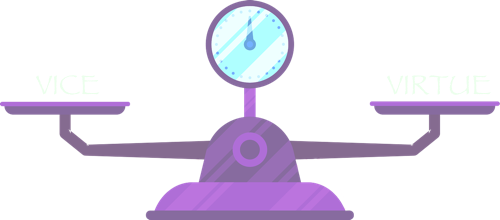The Seven Scales of Vice and Virtue
The Seven Scales are measures of basic principles shared in almost every religion. Finding where we stand on each of these scales helps us reach a higher level of being. With these seven measures, we can rightfully judge and discern the events that are flooding our minds through the media and other channels, as well as learn how to live a more meaningful life.
Visualize each vice and virtue on a scale from -10 to +10. Give serious and objective thought as to where you stand on each scale on any given day. The closer you are to the +10 (virtue), the more peace you will feel. The more you fall to the -10 (vice), the more stress you will experience in your life. Try to measure yourself everyday to help you keep aware of the influences in your life, and how you can change where you feel you need help to bring you closer to peace, solitude and genuine satisfaction.


Pride vs. Humility – Pride is the feeling of satisfaction that arises from something someone has accomplished. Pride attaches us to our actions. In contrast, humility seeks not to compare ourselves to others to measure our self-worth, but rather it helps us keep a modest opinion of ourselves, and separates us from the outcomes of our actions. Pride makes us competitive and humility makes us cooperative.

Wrath/Anger vs. Kindness – Wrath is great anger caused by injustice or misconduct. Kindness tries to sympathize with others, even if they have acted wrongly. Wrath seeks to punish while kindness seeks to understand. When an angry person lashes out against a kind person, the kind person tries to find the source of the anger. When a kind person tries to reach out to an angry person, it tends to make the angry person more irate.

Avarice/Greed vs. Generosity – Avarice is an active form of greed. Instead of hoarding what is already attained, an avaricious person seeks to always make the treasure grow more. Generous people trust in the giving principle of the universe. They know when generosity is freely and happily given, it usually returns tenfold. Greedy people usually worry about losing their worth, while generous people know that they will be cared for if bad luck should fall on them.

Envy vs. Love – When a good thing happens to a person we don’t particularly care about, envy fills us and makes us anxious. A loving person feels joy when a good thing happens to anyone, regardless of judgement of character. Love is being able to look at every person and everything on the earth and see it as a wonderful miracle of life. The envious person sees good qualities of others and wishes he or she had those qualities.

Gluttony vs. Faith and Temperance – The gluttonous person always tries to take his or her fill of anything for fear that the object might not last. This also pertains to people. A person who tries to monopolize the time of an admired person is gluttonous. In contrast, a faithful and temperate person trusts that he or she will always have what is needed. A temperate person knows that the earth can sustain all its life if we learned to take only what is needed, not what is wanted.

Lust vs. Self-control – Lust is the unbalanced desire for things that can never be satisfied. Lust is misguiding in that it makes us seek more and more and leads our perception completely out of reality. This pertains to beauty, power and sex. Exercising self-control lets our senses reset to nominal levels so that we don’t have to keep pushing the levels of living to the extreme. Meditation and sensory deprivation exercises help us to live more balanced, while allowing us to enjoy the good things of life.

Sloth vs. Zeal – Sloth is the lack of energy that keeps us in a rut, slowly eliminating our internal motivation through continued idleness. Zeal is the belief in something better and the ability to focus our internal energy to move in that direction. Zealous people are people in action, while the sloths do nothing but sit and watch the zealous people on television.


